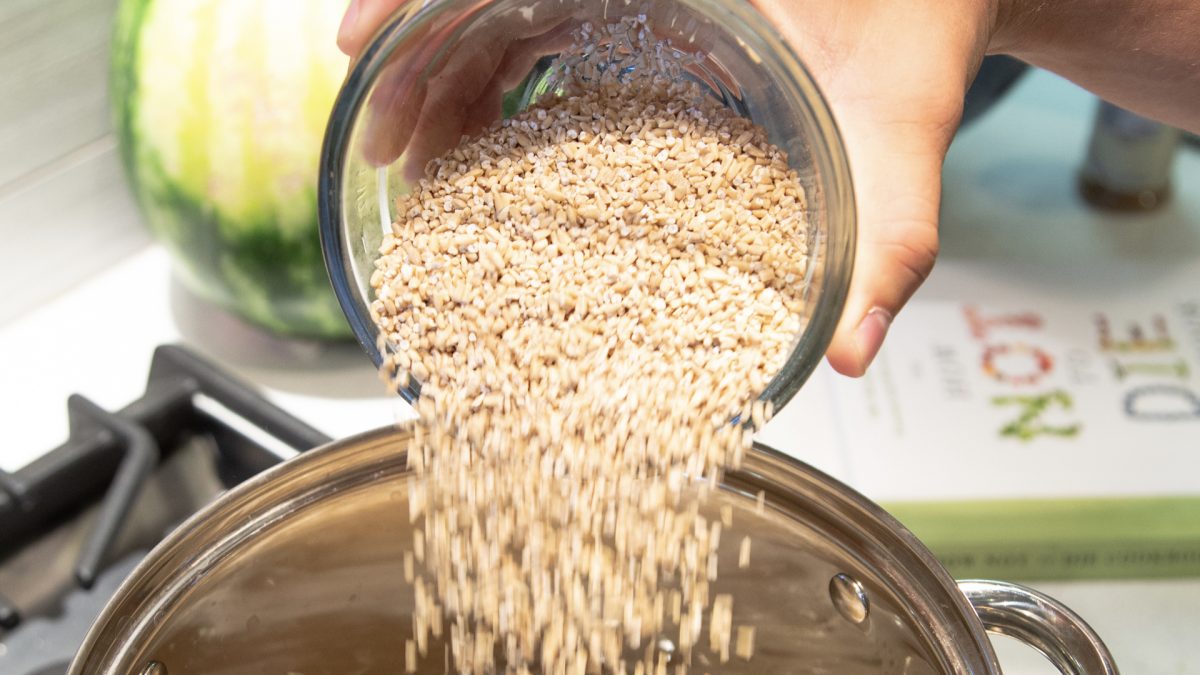
Oats
A 2015 analysis found that people who eat more whole grains, which includes oats, tend to live significantly longer lives independent of other measured dietary and lifestyle factors.
The Different Types of Oats
Oats are available in many forms: instant, rolled, steel-cut, Scottish, and oat groats.
Rolled vs. Steel-Cut Oats
The physical form of food alters carbohydrate absorption. Rolled oats have a significantly lower glycemic index than instant oatmeal, which is just oats, but in thinner flakes, and oat flakes cause lower blood sugar and insulin spikes than powdered oats. Indeed, the same single ingredient—in this case, oats—can have different effects in its different forms.
Why do we care? Well, the overly rapid absorption of carbohydrates after eating a high-glycemic index meal can trigger a sequence of hormonal and metabolic changes that may promote excessive eating. Researchers fed a dozen obese teen boys different meals, each with the same number of calories, and followed them for the next five hours to measure their subsequent food intake. Those who ate the instant oatmeal went on to eat 53 percent more than the boys who ate the same number of calories of steel-cut oatmeal. The instant oatmeal group was snacking within an hour after the meal and went on to consume significantly more calories throughout the rest of the day. The same food but in different forms had different effects.
The Wholiest of All Whole Grains
Beyond focusing just on whole grains rather than refined grains, the wholiest of all are intact grains. Instant oats are better than powdered oats, rolled oats are better than instant, steel-cut oats are better than rolled, and intact oat groats are the best of all.
How Many Daily Servings Should We Strive For?
Consistent with recommendations from leading cancer and heart disease authorities, my recommended Daily Dozen includes at least three daily servings of whole grains, such as oats. Harvard University’s preeminent twin nutrition studies—the Nurses’ Health Study and the Health Professionals Follow-Up Study—have so far accumulated nearly three million person-years of data. A 2015 analysis found that people who eat more whole grains tend to live significantly longer lives independent of other measured dietary and lifestyle factors.
The Many Benefits of Whole Grains
A diet rich in whole grains, for example, may yield the same benefits as taking high blood pressure medications without the adverse side effects commonly associated with antihypertensive drugs, such as electrolyte disturbances in those taking diuretics; increased breast cancer risk for those taking calcium-channel blockers; lethargy and impotence for those on beta blockers; sudden, potentially life-threatening swelling for those taking ACE inhibitors; and an increased risk of serious fall injuries for apparently any class of these blood pressure drugs.
Indeed, eating whole grains appears to reduce the risk of heart disease, type 2 diabetes, obesity, and stroke. Eating more whole grains could potentially save the lives of more than a million people around the world every year. Take note of the whole, however. While whole grains, such as oats, whole wheat, and brown rice, have been shown to reduce our risk of developing chronic disease, refined grains may actually increase risk.
People who ate the most whole grains had significantly slower narrowing of two of the most important arteries in our body: the coronary arteries that feed the heart and the carotid arteries that feed our brain. Since atherosclerotic plaque in the arteries is our leading killer, we should not just slow down the process but actually stop or even reverse it altogether, and eating more whole plant foods, including whole grains like oats, can help.
Oatmeal and Weight Control
Some of oatmeal’s proven health benefits include aiding in weight control. Oatmeal helps to keep us feeling full for longer. Researchers randomized individuals into three different breakfast groups—oatmeal made from quick oats, the same number of calories of Frosted Flakes, or just plain water—then measured how much they ate for lunch three hours later. Not only did those who ate the oatmeal feel significantly fuller and less hungry, but they then went on to eat significantly less lunch. Overweight participants ate less than half as many calories at lunch after eating the oatmeal for breakfast—hundreds and hundreds of fewer calories. In fact, the breakfast cereal was so unsatiating that the corn flakes group ate as much as the breakfast-skipping, water-only group. The soluble fiber in oatmeal forms a gel in the stomach, which delays stomach emptying and makes one feel full for a longer period, helping with weight loss.
Lowering Our Cholesterol and Helping Our Arterial Function
The fiber in oatmeal can lower our blood cholesterol levels so less gets stuck in our arteries. There are also anti-inflammatory and antioxidant phytonutrients in oats that can help prevent atherosclerotic buildup and then help maintain arterial function.
Improving Liver Function
In a double-blind, randomized trial of overweight and obese men and women, almost 90 percent of the participants given real oatmeal had reduced body weight (compared to no weight loss in the control group), as well as –a slimmer waist on average, a 20-point drop in cholesterol, and an improvement in liver function.
For substantiation of any statements of fact from the peer-reviewed medical literature, please see the associated videos below.
Popular Videos for Oats

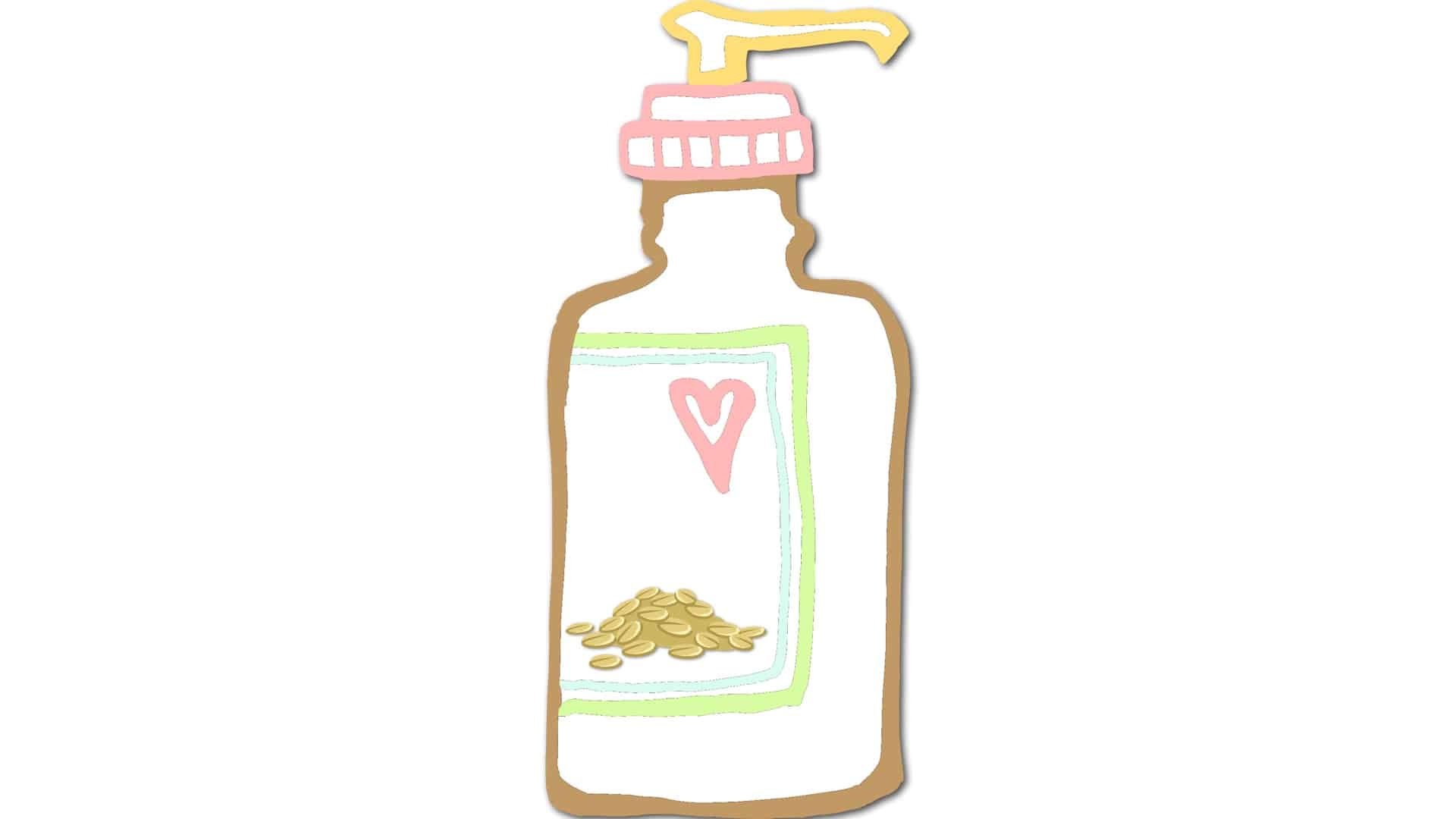
Oatmeal Lotion for Chemotherapy-Induced Rash
Oats are put to the test against cetuximab-type chemo side effects to see just how...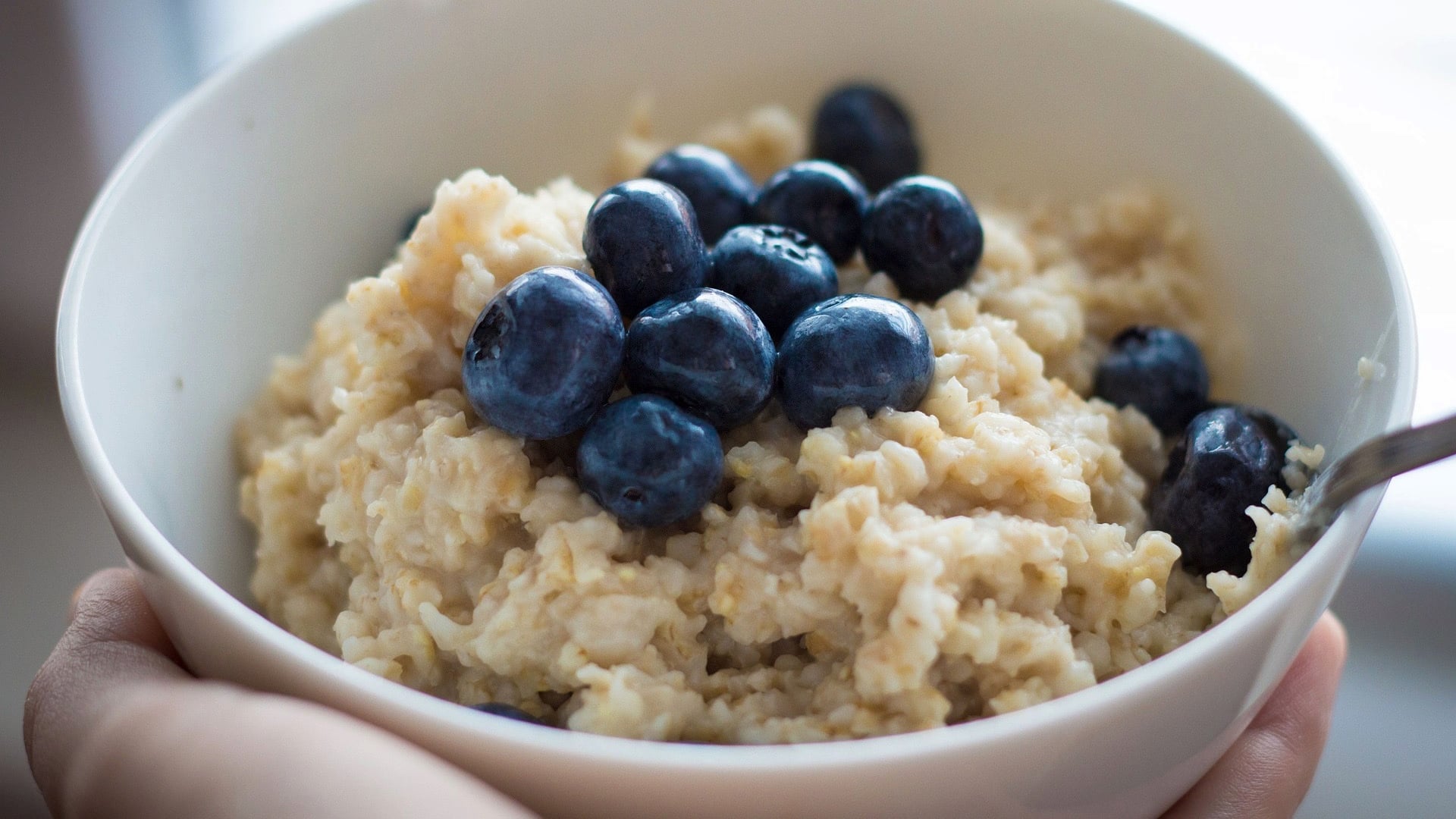
Can Oatmeal Help Fatty Liver Disease?
Is whole grain consumption just a marker for healthier behaviors, or do whole grains have...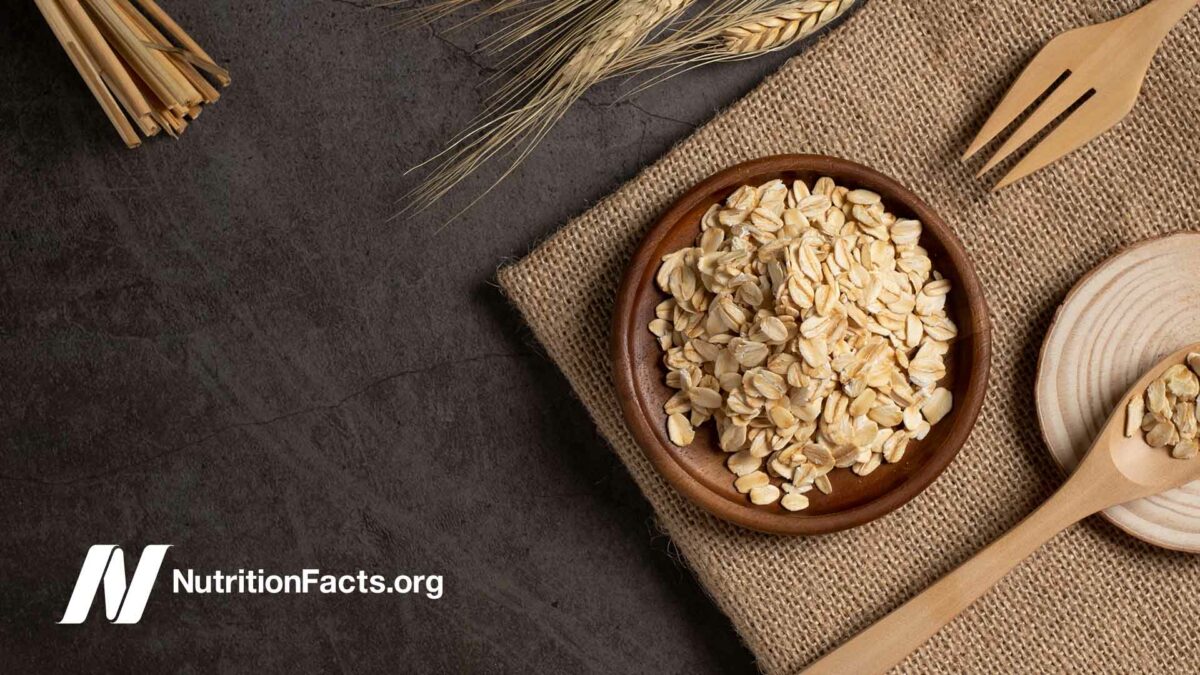
Can Oatmeal Reverse Heart Disease?
Less than 3% of Americans meet the daily recommended fiber intake, despite research suggesting high-fiber...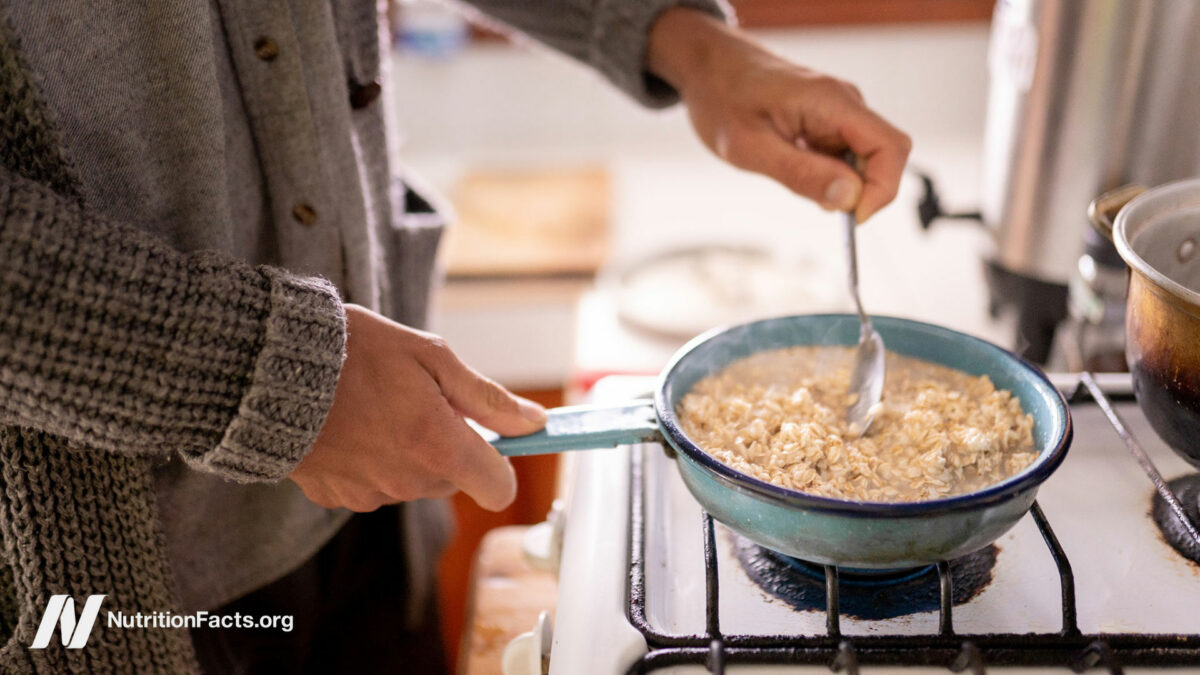
Oatmeal Diet Put to the Test for Diabetes Treatment
What are the extraordinary, lasting benefits we may get from a few days of an...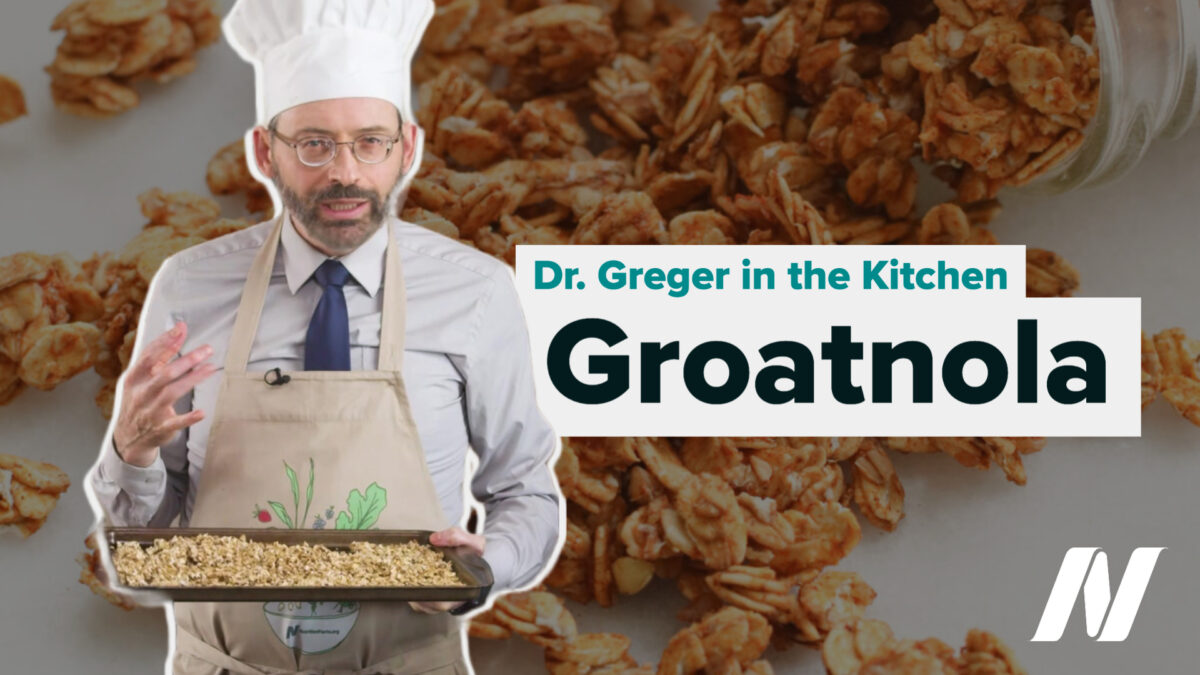
Dr. Greger in the Kitchen: Groatnola
Dr. Greger whips up another of his go-to breakfast meals.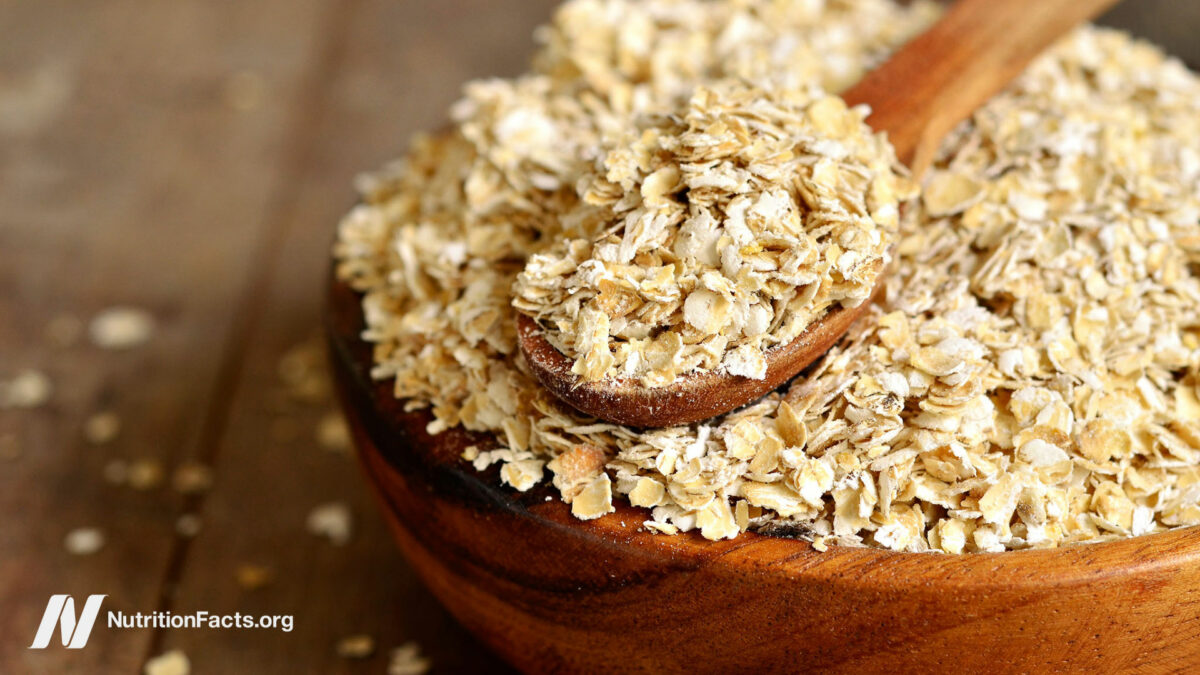
How Does Oatmeal Help with Blood Sugars?
The prebiotic fiber in oats helps to explain why oatmeal can improve diabetic control.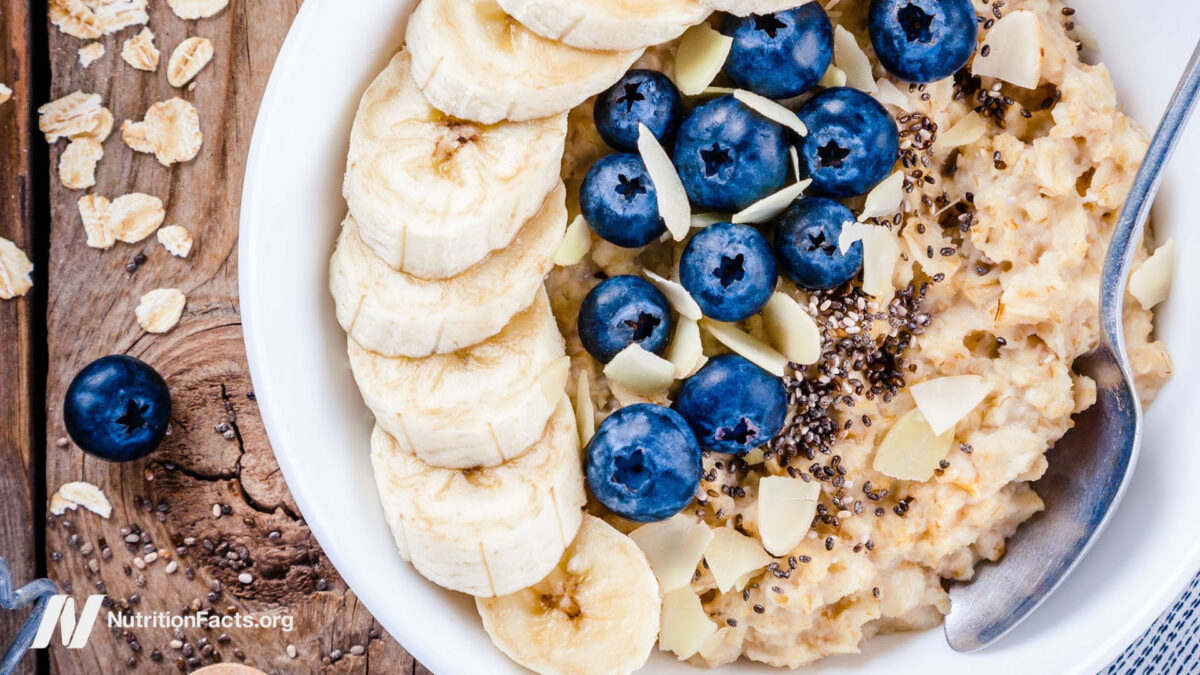
Is Oatmeal Good for People with Diabetes?
Before there was insulin, there was the “oatmeal cure.”All Videos for Oats
-

3 Healthy, Easy Recipes: Appetizer, Pasta, and Dessert
Celebrate the season with recipes from my cookbooks.
-

Dr. Greger in the Kitchen: Groatnola
Dr. Greger whips up another of his go-to breakfast meals.
-

Should We Be Concerned About the Effects of Ochratoxin?
The overall cost-benefit ratio for mycotoxins depends on which food is contaminated.
-

Ochratoxin in Certain Herbs, Spices, and Wine
Most food crops are contaminated with fungal mycotoxins, but some foods are worse than others.
-

Ochratoxin in Breakfast Cereals
One of the few food contaminants found at higher levels in those eating plant-based diets are mycotoxins, fungal toxins in moldy food ingredients, such as oats.
-

Dr. Greger in the Kitchen: Cran-Chocolate Pomegranate BROL Bowl
Prebiotic goodness for breakfast to keep your microbiome happy all day long.
-

Is Sorghum a Healthy Grain?
How does sorghum compare with other grains in terms of protein, antioxidants, and micronutrients? And the benefits of red sorghum compared to black and white varieties.
-

Which Is a Better Breakfast: Cereal or Oatmeal?
The remarkable impact of the structure of food beyond nutritional content or composition.
-

Recipe: Morning Grain Bowls
Here’s a delicious way to start the day! Morning Grain Bowls from the How Not to Die Cookbook.
-

Benefits of Lentils and Chickpeas
Lentils and chickpeas, also known as garbanzo beans, are put to the test.
-

Benefits of Blueberries for Blood Pressure May Be Blocked by Yogurt
What happened when researchers tried to tease out what’s in dairy that interferes with the health benefits of berries and tea?
-

Dr. Greger’s Daily Dozen Checklist
In my book How Not to Die, I center my recommendations around a Daily Dozen checklist of everything I try to fit into my daily routine.
-

Dr. Greger’s Daily Dozen Checklist
In my book How Not to Die, I center my recommendations around a Daily Dozen checklist of all the things I try to fit into my daily routine.
-

Do the Pros of Brown Rice Outweigh the Cons of Arsenic?
Are there unique benefits to brown rice that would justify keeping it in our diet despite the arsenic content?
-

Arsenic in Rice Milk, Rice Krispies, & Brown Rice Syrup
I recommend people switch away from using rice milk.
-

Arsenic in Infant Rice Cereal
When it comes to rice and rice-based products, pediatric nutrition authorities have recommended that arsenic intake should be as low as possible.
-

Eating More to Weigh Less
Energy density explains how a study can show participants lose an average of 17 pounds within 21 days while eating a greater quantity of food.
-

How to Prevent a Stroke
Insufficient intake of fiber-rich foods may lead to the stiffening of our arteries associated with risk of having a stroke.
-

Oatmeal Lotion for Chemotherapy-Induced Rash
Oats are put to the test against cetuximab-type chemo side effects to see just how soothing and anti-inflammatory they can be.
-

From Table to Able: Combating Disabling Diseases with Food
Dr. Greger has scoured the world’s scholarly literature on clinical nutrition and developed this new presentation based on the latest in cutting-edge research exploring the role diet may play in preventing, arresting, and even reversing some of our leading causes of death and disability.
-

Whole Grains May Work as Well as Drugs
The consumption of three portions of whole grains a day appears as powerful as high blood pressure medications in alleviating hypertension.
-

Uprooting the Leading Causes of Death
Death in America is largely a foodborne illness. Focusing on studies published just over the last year in peer-reviewed scientific medical journals, Dr. Greger offers practical advice on how best to feed ourselves and our families to prevent, treat, and even reverse many of the top 15 killers in the United States.
-

Antioxidants in a Pinch
Some herbs and spices—including cinnamon, cloves, lemon balm, marjoram, oregano, and peppermint—are so rich in antioxidants that just a small pinch can go a long way.
-

Calculate Your Healthy Eating Score
Rate your diet on a scale of 0 to 100 using the phytochemical index, and compare your score to the Standard American Diet.
-

Is One Egg a Day Too Much?
The Harvard Physicians’ Health Study suggests that those eating an egg a day live shorter lives.
